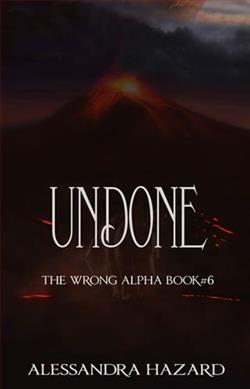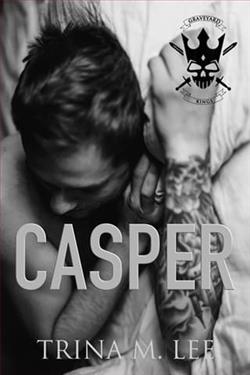Page 45 of The Music Demon
“Rock and Roll Hall of Fame,” Lyric graciously conceded.
The newly dubbed Doo looked at Shivaun. “What did you mean when you said my ‘true’ name?”
“Well,” she began, “the colors and lights that surround your body are your essence. ‘Tis like if you put hot coffee into a thermos? The thermos contains the heat for a limited time. It radiates outward and seems to disappear, but it does no’ go away. It just changes form. Your real person, your essence, is like heat. ‘Tis in your body for a limited time. But when your body dies, you go on in a different form. I can see the change in your essence, um, read the colors. You embrace the name Doo Darby like ‘twas always yours.”
“It was,” Lyric said. “It’s the name the neighbor gave him. So. Doo Darby. Are we ready to put this issue to bed and get on with your briefing?”
“What are you gonna do about these documents?” He held the wallet up for visual support.
Lyric sighed. “Take a look at your license.”
With hesitation, Gray-now-Doo opened the wallet and took out the license. Though he would never admit it, he got a little thrill from seeing the name Doo Darby. It felt right.
He tried not to look too pleased, but Doo wasn’t great at hiding emotion.
Shivaun laughed. “Glad you like it. Doo.”
“Now that that’s settled. Twelve hours from now, more or less, is go time.” Lyric motioned to the book on the table where Doo rested an elbow. The book that had not been there before. Doo glanced down, but took the manifestation in stride, almost as if he was getting used to such things. “This is your twelve-hour bible. Between now and departure you need to familiarize yourself with the differences between then and now.
“If you make references to things people from then don’t know, they’ll start to wonder about you. If there are too many, the wonder will turn into concern. If they are too blatant, the concern will turn into forced psychiatric observation. First difference. Right there. This society took care of the mentally challenged back then. That’s the good news. The bad news is that mental facilities are notorious for having doors that swing one way.”
“You’re scarin’ the lad,” Shivaun said.
“I don’t want to scare you, ah, Doo. But I want you to be sufficiently alert so that you’re always conscious of what you’re saying. A few decades doesn’t seem like much, not to someone like me, but there’s been a lot of change. Mostly because of technology and that’s the thing most likely to trip you up.
“This book gives the entire history of the world through 1967. A person born in 1947 would be twenty years old and the most tech-complicated thing they would’ve ever heard of is a color TV.” The demons watched Doo’s face slowly fall as he began to realize, in earnest, that there was much more to living in the sixties than great music. “Tonight I want you to go to your room and study the last couple of chapters. Get a feel for the culture, for politics – not just U.S., global. Get to know speech patterns and slang.
“Your life is full of thoughts and speech you take for granted that would cause raised eyebrows or strange looks in 1967. If you let your guard down and say, ‘Oh my god,’ people are either going to think you’re a brilliant wordsmith who’s thought of a new phrase to suggest extreme surprise or they’re going to add blasphemy to their list of reasons why you should be drawn and quartered.”
“Drawn and quartered?” Doo’s eyebrows suddenly met in the middle.
“He’s exaggeratin’. Right?” Shivaun prompted Lyric to dial down the hyperbole.
“Yes,” Lyric said. “Not even Jim Morrison got drawn and quartered.”
“I don’t know what that is,” Doo confessed.
Lyric and Shivaun stared at Doo for a few seconds, both separately deciding that a definition of drawing and quartering might not be in the best interest of the briefing at best. And might reinstate Darby’s anxiety at worst.
“The thing is,” Lyric continued as if a question hadn’t been posed, “in a short time, like within three weeks, you will have acclimated to the times and you won’t have to think quite so hard about what you say before you say it.” The two demons noticed that Doo’s knee bounced rapidly as he stared at them without expression. “The other thing is that your intimate knowledge of the music of the time gets you more than halfway there. Don’t refer to movies made after 1967. Don’t refer to music released after 1967. Don’t talk about famous musicians who aren’t famous yet. Don’t talk about musical equipment that hasn’t been made yet or guitars that haven’t been built. Watch the slang. Closely. That’s about it.”
“I got it,” Doo said.
“Okay. Good. Tomorrow, when we get there, I’m going to stick around for a while. Make sure you’re set up. Bank account. Clothes. Guitar. Place to live.”
“Job?”
“You won’t need a job. You’ve got a benefactor.”
“You mean somebody who pays me to be an artist. Like Michelangelo?”
“Exactly like that. You’re not going to be rich, but you’ll have enough to get by and your bank account will maintain the same balance unless you start to think you’re Howard Hughes.”
“Who?”
Lyric sighed. “Never mind. The point is I’m not going to drop you on the sidewalk and say tata.”
Doo flashed his signature lopsided grin that was heartthrob material. “You’re like a dad takin’ me to college.”















